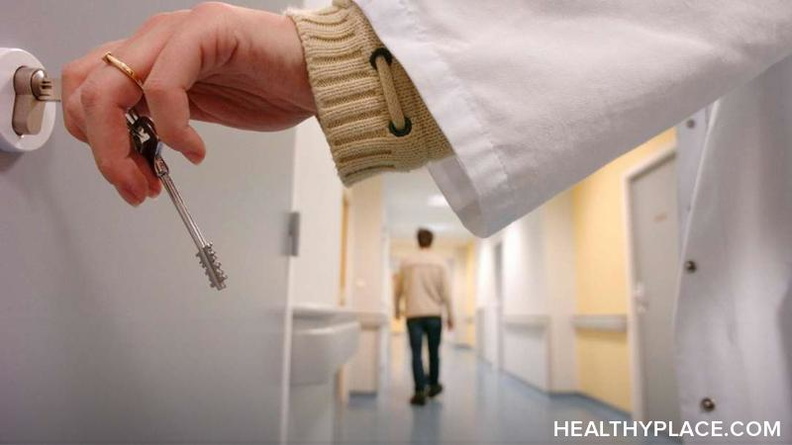Depression Treatment: Outpatient vs. Inpatient

When it comes to depression treatment, is outpatient treatment or an inpatient depression treatment program best for you? That depends. Once a person has been diagnosed with depression, his or her doctor should discuss the best options for care based upon type and severity of depression symptoms. Whatever care is prescribed, however, it’s vital for people to understand that there are no quick fixes for depression. It takes time to find the level of care that works best for each person. In fact, it’s not unusual to try a number of different levels of care in order to treat depression effectively.
Outpatient Treatment for Depression
Many people who have depression may find a combination of outpatient treatments work at alleviating their symptoms.
It’s not unusual for antidepressant medication to be a first line depression treatment. Antidepressants help increase the levels of neurotransmitters lacking in the brains of people who have depression. There’s a long list of antidepressant medications on the market and people who have depression may have to try a variety of these drugs before they are able to find one that works to alleviate their depression. These medications often take 6 to 8 weeks to become truly effective, so patience is key when finding a medication that works.
After starting antidepressant medication, many discover that other options help them as they learn to battle this illness. For instance, an outpatient therapist is an excellent tool for helping manage feelings and issues surrounding depression. There are different types of therapists available; the most important factor in choosing an outpatient therapist is the connection between the patient and the therapist.
If no connection exists, it’s important to continue searching for a therapist who can help guide and support you during your depression recovery. (How to Find A Therapist Who’s Right For You). Word of mouth, physician referrals, and the internet are excellent ways to find a therapist who specializes in depression. The cost for a therapist can range from $40-$250 per hour, depending on a variety of factors. If you have health insurance, check with your company to see if therapy is covered.
 In addition to medication and outpatient therapy, there are a number of lifestyle changes men and women can use to further their depression treatment. Developing a social support system can be very important as the support of others can make a world of difference for those with depression.
In addition to medication and outpatient therapy, there are a number of lifestyle changes men and women can use to further their depression treatment. Developing a social support system can be very important as the support of others can make a world of difference for those with depression.
Depression support groups are a great option as they allow connections to others who can teach ways of managing the illness and reduce social isolation. It’s very important that people who are depressed engage in healthy habits such as eating and sleeping regularly, as improper nutrition and disrupted sleep can contribute to depression. Additionally, exercise is a fantastic mood elevator for people; men and women with depression should aim for between 30 and 60 minutes of exercise most days.
Inpatient Treatment for Depression
When people are facing severe struggles with depression, an inpatient depression treatment program can be one of the best solutions to kick-start treatment. In my past experience with patients struggling with depression, I find that inpatient is the most effective treatment available. Over a period of a week to a few months, it allows an individual to dig deep and to the core. An inpatient program allows them to escape the stresses of daily life and focus entirely upon their recovery.
Many inpatient programs exist and are able to help people who have depression by offering a warm, comforting environment to begin tackling depression and controlling medication treatment. Most inpatient treatment centers combine outpatient treatment options as well as providing a space to focus fully upon depression recovery.
In an inpatient program, people with depression spend one-on-one time with a therapist in order to help develop healthy coping skills, prevent depression relapse, and discuss the roots of depression. Group therapy is a vital component to inpatient care, as it allows individuals who are facing similar challenges to work together to tackle daily problems and support one another. Families and loved ones are generally involved in depression treatment as it allows them the chance to learn ways to help and support their depressed loved one.
Depression Treatment Works
Depression is best treated through an array of self-care options, including medication management, therapy, and inpatient treatment which combines the outpatient therapy options and allows for the chance to work solely on depression recovery. No matter the level of depression, it can be managed. Those who have depression can live a normal life with the right tools and social support.
You can also find Lauren Hardy on Google+.
Treatment Program: Lauren Hardy writes on behalf of Lakeview Behavioral Health, a leading inpatient program for men and women who require holistic-centered care for their depression.
APA Reference
Hardy, L.
(2014, February 26). Depression Treatment: Outpatient vs. Inpatient, HealthyPlace. Retrieved
on 2024, April 17 from https://www.healthyplace.com/blogs/mentalhealthtreatmentcircle/2014/02/depression-treatment-outpatient-inpatient
Author: Lauren Hardy, MA
So I've had depression and anxiety my whole life. I've been diagnosed with both an anxiety and depression disorder I've thinking about the outpatient program, but I'm to scared to ask my parents about it. On the outside I don't really show my pain, but on the inside I'm dying. I'm scared they'll say that I'm fine. I'm not suicidal, and I feel guilty saying that I'm doing well at all, when people are wanting to kill themselves. Any way if anyone reads this I'm not important. I need to let the people more severe than me get help.
It's a perfect match.. if only you knew... I'm so lost. I can almost swim in fear, anixity. No one is there for me. .Ineed to get away, and no one wants to acknoledgee anyore.. a pain uncomfortability,. And disfunctoonal hateful vibes. ... Is anyone here for me.. I feel alone..helpless,. I just want to be normal, and peaceful..
Someone above posted this to seek out helpful resources.
https://www.healthyplace.com/other-info/resources/mental-health-hotline-numbers-and-refer…
Hi Kelly,
I'm not sure what you need help with but this list of resources and helplines should give you a place to reach out: https://www.healthyplace.com/other-info/resources/mental-health-hotline-numbers-and-refer…
- Natasha Tracy
- Blog Manager
what are you going thru? i have severe anxiety and depression. Diagnosed bipolar many years ago. i go thru good cycles and bad cycles. i have never been hospitalized, but have been thinking a lot about it lately. As my anxiety is suffocating.. Lmk whats going with you, maybe i can help.
, I would like to sign up for outpatient treatment in the Daytona area I'm a snowbird and I need to talk to somebody and check my medication out and all my depression is getting worse
Hi Ron,
You should talk to a doctor or go to a hospital for more information about outpatient treatment.
- Natasha Tracy
Inpatient Mental Health Care is, currently, a joke. Between 2008-2012 many states were removing mental health beds from their facilities. In the state of Minnesota this has led to 50% fewer beds available. Now, it being 2016, the only policy that seems to be viable to these facilities is to either deny patients access to the treatment, due to bed shortages, or to have such a fabulously quick turn around time that nothing has been solved.
One can think of it as a recidivism rate. If you come into the hospital for three days and your problem is not ultimately resolved you will find yourself right back where you started. I know I have.
As has been stated above, many times, there are no inpatient individual therapy sessions. It is, for all intents and purposes, a holding cell where the one and only goal of most facilities is stabilization and release.
Something has to change.
Nor is it "warm and friendly". They are short-staffed, constantly hurried, and only check in with you for a few seconds per day, then check it off in their list.
I was recently in an inpatient facility that was really pretty excellent in terms of environment. There were only 20 patients max and we had our own rooms. The problem was two-fold. First, the counseling (if you want to call it that) was all done in groups. I was there for 5 days and saw a psychiatrist 3 times 1:1 for a grand total of about 30 min. Second, all patients had the same restrictions. For example, we were only taken outside 1-2x per day for a max of 15 min each time. This was horrible for me because I love being outside and find the outdoors to be therapeutic.
Lulu, did you find anything because I could have written what you said.?
I have been suffering from anxiety and depression for over 20 years. I don't want to live like this anymore! I'm not suicidal or want to cause harm to myself, I just want to feel normal (whatever normal is for me)! Over the last 5 years it's gotten really bad, and over the last year, REALLY, REALLY BAD! I'm looking into inpatient therapy. Any suggestions on a good facility. I don't think a hospital could help me.
I'd really like to find an all around facility for depression, anxiety, and other physical health issues. I had a spinal cord injury 5 1/2 years ago and have true pain, nerve pain, headaches, shoulder subluxation, bladder issues, etc. and I can't tell what pain is coming from my injury or my depression/anxiety. So a facility where I could be completely evaluated and my meds be discussed with all the doctors, but one doctor managing them would be awesome! I'm tired of hopping from one doctor to another where there is no communication between any of them. I feel like I'm ot getting anywhere. I feel very blessed because my injury is incomplete. I can walk, talk, use the bathroom, drive, etc. I'm very lucky I guess.
If anyone has any thoughts, please post!
Pray, and go to church and get envolvef in the good things they do, if the one you go to doesn't have any programs go yo another church that does. Prayer works. Take vitamins and eat healthy lots of water. Talk to your therapist, venting your feelings helps. GOD Bless you all!
Comments like this are a factor in suicides. think before you spew such ignorant propaganda. I've heard of nutritional deficiencies helping improve -minor- mood dysregulation when reversed, but vitamins alone rarely if ever cure nothing. The same goes for yoga. I'm happy - and you should feel blessed - that you have not experienced the horror of disabiling mental health conditions that destroy your life, take it, or worse - stop it in its tracks.
I've been though hell these past few months. I'm18, my life should be great & just starting. I have had very severe anxiety and depression and have been considering an inpatient program and even my parents have suggested that since they feel they can't do much for me anymore. I can't live normally anymore because I'm so scared about something horrible happening to me and that's all I think about. I am terrified to work, or to do anything. I am on medications and have therapies scheduled and have been reassured that i'm physically okay, but the thought remains and I just want to be myself again instead of relapsing harder and harder into my depression & anxiety. I'm not sure if there is any sort of inpatient program in my area like described above, but by most of these negative comments, maybe I shouldn't go into a hospital for that kind of treatment. I'm just really conflicted. Any help or suggestions would be great.
I have been dealing with depression on and off since a young teenager. I suffered a horrible trauma 20 yrs ago and I have been progressively worse since. Hospitalized for wanted to end my life sticking myself with needles all over my body. Kept in Hospital 32 days and outpatient program. Felt much better in hospital but after release it went back and forth depending on how good or bad situations in my life were going. Past few yrs depression is completely taking over. All I do is want to be alone sit in Bathroom every day for most of day. Partner NOT AT ALL HELPFUL SEEMS TO ENJOY TEASING IRRATATING MAKING ME FEEL NO LOVE NO CARING I DON"T SEE A REASON TO BE HERE. My own children don't bother with me IM ALONE MISERABLE JUST DON'T HAVE THE NERVE TO FINISH MYSELF OFF> I HATE LIFE> EVERYDAY.
I have been dealing with mental health issues for a long time and I have been hospitalized three times after thinking seriously about susicde and still do the voices are a new thing don't like it I feel very much alone in this I have a really good theropjst and she has helped a lot I don't want to make the decision to go to the hospital because I'm hard headed but if I'm told to most of the tine I will I really do want to feel better
However, treatment options for depressed patient are numerous, but they must moderate by individual criteria. Out-patient and in-patient way remain as corn stone option on satisfied psychiatric treatment of this psych-somatic disease. Favors and disfavors of these are related to many personal and circumstantial parameters that should modelled by individual necessities. The essential condition to appropriate treatment and management of depression to create and maintain good therapeutic alliance. In this direction, the sense of trust of depressed patient to therapist indicates crucial role in positive outcome of treatment. Moreover, this benefit prerequisite seeks professional and personal preparation of psychiatrist. As to refer to second principle, it is value to mention the fact that empathy consist the nucleus of successful psychiatric treatment of depression. It encompass the sense of sincerity, compassionate, dedication and seriousness of psychiatrist to own patient. Otherwise, the therapeutic process would be no-humane and scornful manipulation with dignity of depressed patient. This therapeutic approaching is important for two option of treatment: Outpatient and Inpatient treatment.
I have severe treatment resistant depression. I have been in 7 hospitals. If you are NOT psychotic & not a threat to yourself or others, do NOT go to a hospital! They are horrible places meant for much sicker people. You will be attacked by patients. There is not enough staff to stop this. Violent fights between patients will occur. Sometimes gangs will form. A warm comforting environment ? You've got to be kidding me. You are treated like a number in a cold, unforgiving environment. There is no one on one with anyone except a psychiatrist for 5 minutes when you 1st arrive. If there are any groups, they are art, music, etc geared at the pre-school level & most likely run by psychology students. It is scary. It makes you worse. It is hell. I have never been to a depression "treatment" center because I can't afford it. I look at the pictures of these inviting centers in warm locales. I wish I could try one. My advice is to never go to a hospital. You will never be the same.
i've never gotten individual therapy on an inpatient unit except for in a specialized trauma program for those with PTSD. It was the only hospital experience I found helpful and I was discharged in a much better place. Hospitals need to provide more individualized care and not kick people back out the door in 3 days. It's costing more money in the long run due to people revolving in and out and in out, unable to get the treatment needed.
Most psychiatric hospitals no longer provide individual therapy. Length of stay can be a short as a few days. They don't keep you long enough for an antidepressant to kick in anymore. I think that is why there so much of a push for the antipsychotics in depression- they work fast. They are dirty drugs but they just might "stabilize" you enough so they can push you out the door in the time frame that your insurance company desires.
